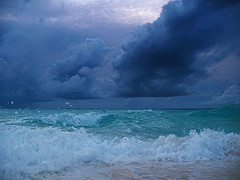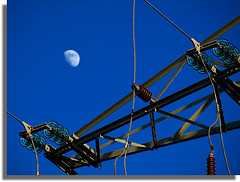I finally got around to watching “An Inconvenient Truth” tonight, and I have to say, I’m all riled up.
 There can be no doubt that climate change is real and is caused by human activity. That’s not what I’m all riled up about. I’m all riled up about what we can do about it and more worryingly, is it already too late?
There can be no doubt that climate change is real and is caused by human activity. That’s not what I’m all riled up about. I’m all riled up about what we can do about it and more worryingly, is it already too late?
One of the first things to really “shock” me in the film was the graph of the world’s population. I suppose I’d always “known” it, but I’d never really “known” it, if you follow me. Our population isn’t growing exponentially, it’s growing in some way that defies my knowledge of mathematics to explain it. It’s more like a straight line rising straight up than any sort of curve. In the 1950s there were only a little more than 2 billion people in the world – now we are over 6 billion. In another 30 years there will be close to 9 billion.
That is one hell of a lot of people.
What is perhaps more disturbing is the percentage of the population that is “industrialized.” Because that percentage is rising at an astronomical rate as well. And if you consider that the more “industrialized” a people are, the more energy they consume, well… you don’t need a degree in economic theory to understand basic supply & demand. With that many people, demand for energy will go up a lot. And there is no way our supply can keep up – even if there were vast, untouched resources on the same scale as the Middle East, it wouldn’t be enough to keep up.
Without change, we are going to consume more and more energy. As supply dwindles, and as demand increases, economic pressure will push us to consume every last bit of energy possible – and to hell with the consequences.
We will put the future of the human race – the future of our children – at risk, just for a few more years of energy, of the lifestyle we’ve gotten used to, that we’re “comfortable” with. And this risk is far more than the risk we used to be afraid of at the dawn of the Nuclear Age.
There are only 3 possibilities to deal with this problem:
- Reduce the population (thus decreasing demand)
- Relocate the population (I’m talking about space colonization)
- Invent new technologies to make better use of the limited energy we posses
Let’s address them in turn.
Number 1 is going to happen if we don’t do something yesterday. If things continue as they have gone in the last 50 years, we will see mass starvation and massive death all across the globe. One way or another, there will be fewer people around. But it won’t be a pretty sight.
 Number 2 is my personal choice. Space colonization brings with it the ability to harvest energy from the sun – or even terraform other planets and use resources there instead of bringing them from Earth. At least then, if we screw up the Earth so bad, we ourselves won’t totally die out.
Number 2 is my personal choice. Space colonization brings with it the ability to harvest energy from the sun – or even terraform other planets and use resources there instead of bringing them from Earth. At least then, if we screw up the Earth so bad, we ourselves won’t totally die out.
Number 3 is starting to happen – although still too slow in many people’s opinions. And new technology can only take us so far – we can only squeeze so much out of a limited resource, no matter how efficient we make the technology. Without deep, radical, fundamental changes in our understanding of how to get energy, we will run out.
When you look at it like that, all 3 choices seem pretty dismal. But the great thing is that we don’t have to choose just one – we can take the best part of each solution and try to use them all at once, and maybe together we can do something about it.
But there’s a dark side to all this. To make a difference, we all really have to do it together. I mean everyone, everywhere, every nation, every city, everyone. We can’t do it piecemeal. It can’t just be one or two or even three countries – even if they are the biggest polluters or energy consumers. It has got to be everyone. Because our human nature demands it – if you have to restrict yourself, change your lifestyle, you’re going to resent your neighbor if he (or she, or they) don’t have to do the same – if they get to keep their lifestyle, if they don’t have to make sacrifices like you do. Our human nature demands that we all give equally, or else none of us will give. (This is, of course, a form of the “tragedy of the commons.”)
And we will all have to give. This sort of change isn’t going to be easy. I have a favorite little quote from one of my favorite movies, “The Lion King,” that goes something like this:
“Change is good…”
“…Yeah, but it’s not easy!”
Truer words were never said.
But we must change. It’s not going to be painless – let’s get that right out in the open right now. It’s going to hurt. Maybe a little, maybe a lot. That’s the way change is. And like most major paradigm-shifting changes, you can’t really see how things are going to be until you’re on the other side – and so will it be with this change. We don’t know what the future will bring, or even what it will be like. But we know we have to make the change. Because we do know what the future will be like if we don’t change.
It is not going to be easy. But it will be good.
Once we are on the other side, things will be better. We’ll have the technology, the policies, the systems in place and it’ll all be easy. Because once you’ve made the change, and it’s over with, well, it’s no longer change anymore – it’s just the way things are.
As the movie credits rolled, I was reminded of another quote that I really like – maybe you’ve even heard it before. I think that it is just as appropriate now as it was when it was first uttered:
“For, in the final analysis, our most basic common link is that we all inhabit this small planet. We all breathe the same air. We all cherish our children’s future. And we are all mortal.”
John F. Kennedy
Address at American University
Washington, D.C., 1963
(Image credit to muha… and Kliefi for their Creative Commons licensed images.)